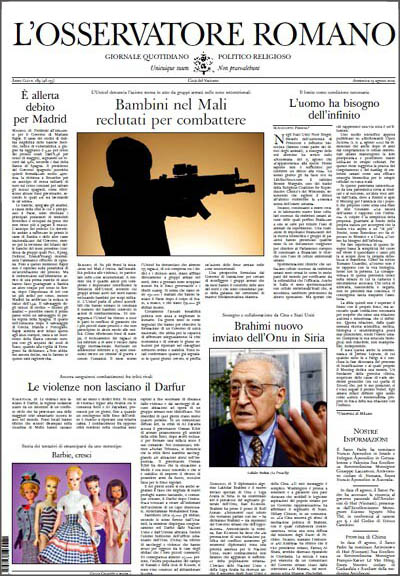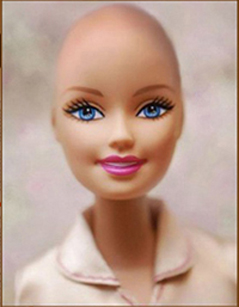Just when I thought I could no longer be amazed at the ludicrous things coming from today’s Vatican, I was surprised. On the front page of the August 19, 2012, L’Osservatore Romano, the Vatican organ, was a picture inviting the reader to an inside article on page 5 that promotes a bald Barbie doll. The article, authored by Giulia Galeotti, paid tribute to Mattel’s Barbie for starting to “grow” on two fronts: she is becoming feminist and politically correct.

On the front page of the Vatican organ, bottom left, a photo promoting Barbie - an article follows inside at page 5 |
According to the Vatican organ, both are good trends that are repairing the bad reputation of the formerly empty-headed and full-figured doll.
The article begins by acknowledging that Barbie has been “strongly criticized and stigmatized, and rightly so,” as a symbol of “plastic beauty and vacuous blondeness.” But Galeotti sees value for girls in the fresh images portrayed by the new “I can be Barbie” line, which portrays the still-sexy Barbie in high-level careers or typically male professions.
So, Barbie is presented as surgeon, astronaut, peace ambassador, rock star, Olympic athlete, doctor, military officer, pilot, police officer, firefighter, veterinarian and paleontologist. We even have - Galeotti exults - a Barbie president of the USA. This tells girls that a successful career is the way to fulfill themselves, not by being wives and mothers. In effect, the Vatican Barbie story corroborates an egalitarian message that has been coming from the post-Vatican II Church for some time now.
A bald Barbie
The author goes on to praise toymaker Mattel’s initiative of making a bald Barbie for girls who have lost their hair due to cancer or other illnesses. Galeotti then goes a step further and makes an appeal for a bald Barbie doll to be available on the toy store shelves for all children, so that they can become sensitive to sick children without hair.

Above, the paper pictures an immodestly clad doll; below, the praised bald Barbie
 |
It is another adaptation of the Church to modern culture, adding to those we have seen recently on the pages of the L'Osservatore Romano in articles promoting the Beatles, Harry Potter and Michael Jackson. Now, it is promoting a politically correct Barbie.
A Facebook campaign in the US first made the bald Barbie plea. The bald doll is supposed to help bald children or children of mothers who are bald “feel pretty and good about themselves.” It sends the message that bald is beautiful and is no big deal. It is the wrong message Americans often give in face of suffering: "Everything’s okay."
But, objectively speaking, bald is not beautiful. And everything is not always okay when you have cancer.
The Church always taught that physical defects and serious illnesses are crosses to be borne with fortitude. Often, such crosses bring us closer to Our Lord and Our Lady when we turn to them to ask for the strength and courage we need to bear them well. The cross, the Church teaches, is a gift. Our Lord told his disciples, “If any man will come after me, let him deny himself, and take up his cross, and follow me.”
A serious illness, when well accepted, helps a person – even a child – learn to confront the inevitable, death, and to prepare the soul to appear before God.
The position of the Vatican organ ignores all this. We have to pretend bald is beautiful, and lobby for bald dolls to make children feel good. All this is to prevent children from realizing that they are in a world marked by original sin. The ideal happiness is not to be achieved here on earth, but in Heaven. So, we must accept the crosses God sends us and act accordingly.
Instead of saying this, the Vatican promotes the godless pagan utopia, where we have to pretend not to see our defects and illnesses in order to be happy.
The bald Barbie is “politically correct,” Galeotti asserts, and this makes for an improved and acceptable doll. She also praises Barbie’s friend Becky, who is paraplegic and in a wheelchair. The picture L’Osservatore Romano prints displaying an immodestly clad Becky is hardly a model for youth. But morals seems to have a secondary place in the post-conciliar Vatican.

Posted August 31, 2012
|